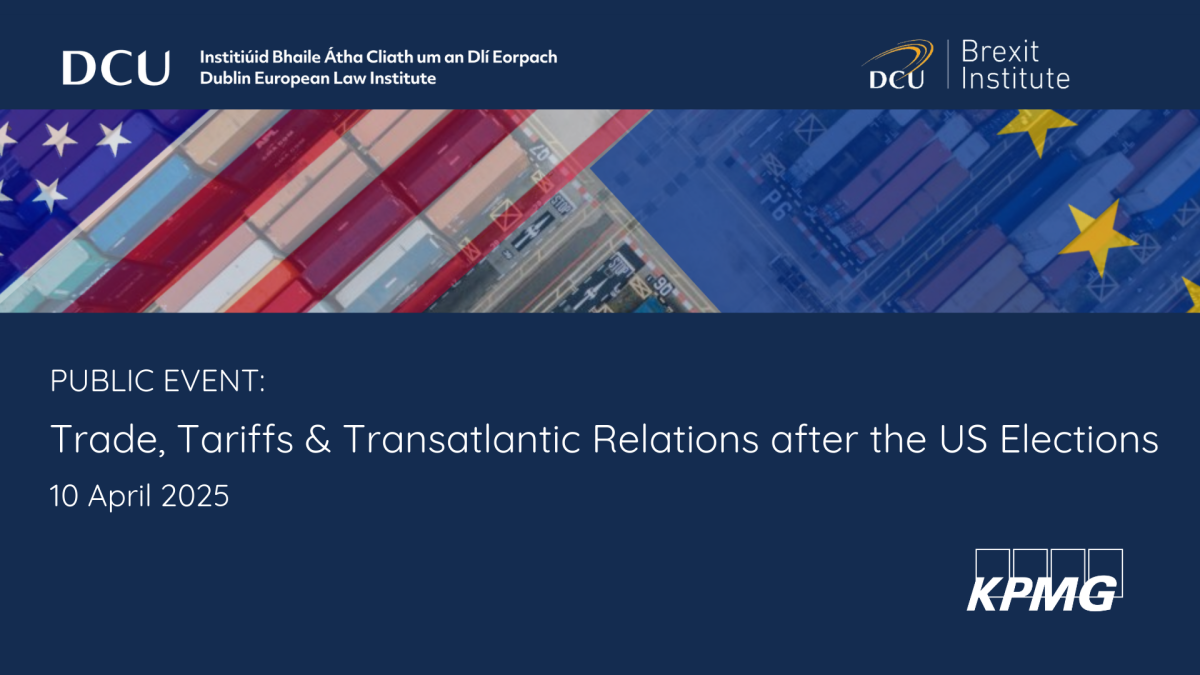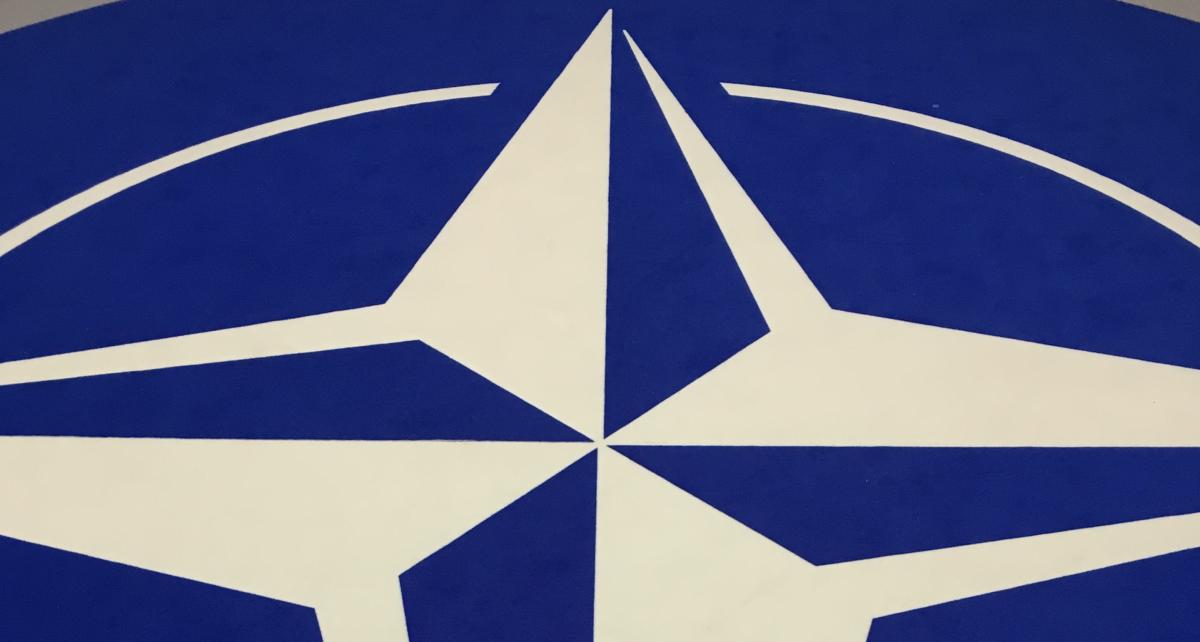
Elettra Bargellini (Dublin City University)
On 10 April 2025, the DCU Brexit Institute and the Dublin European Law Institute (DELI) hosted an online event on ‘Trade Tariffs and Transatlantic Relations After the US Elections’. The event was organized by Dr. Niall Moran, Assistant Professor in Economic Law at DCU and Deputy Director of the Brexit Institute, as part of his Jean Monnet module on Levelling the Playing Field in EU Trade and Competition Law. The event was sponsored by KPMG Italy.
Ms. Sarah Collins (Brussels Correspondent, Business Post) moderated the event. After highlighting the event’s timeliness amid evolving transatlantic trade dynamics, she gave the floor to Dr. Cecilia Malmström, former EU Commissioner for Trade. Dr. Malmström began her keynote address by stressing that the transatlantic relationship and the international rules-based order have become severely fractured. She outlined what she sees as the EU’s key priorities in responding to current challenges: demonstrating assertiveness through retaliatory tariffs and trade defense instruments; concluding new trade agreements (arguing that the EU should join the CPTPP, as it is likely to become the forum where future standards and rules are set); continuing to push for WTO reform and stabilization by forming coalitions of willing countries to advance on green and digital trade; and pursuing EU reforms to enhance innovation and competitiveness, including the simplification measures proposed in the Draghi and Letta reports. While acknowledging the open hostility toward the EU shown by the Trump administration, she underlined the importance of maintaining cooperation with US cities, states, universities, NGOs, and other non-federal actors. She concluded by noting that, traditionally, crises and external pressures tend to serve as catalysts for reinforcing and deepening EU integration. She believes this will be the case once again.
Subsequently, Ms. Collins gave the floor to Prof. Massimo Fabio (Professor, Trade and Customs Law at Università Europea di Roma and Partner, Head of Trade & Customs Practice KPMG Italy), who offered his perspective on how potential future US tariffs could affect EU businesses. He noted that companies should focus on the three pillars of customs procedures: classification, valuation, and origin. These should be calibrated to explore possibilities for reclassifying products through the application of rules of origin. Businesses should also aim to identify the lowest legally admissible taxable base, as permitted under both EU and US legislation. Among the strategies that could help mitigate the impact of US tariffs, he mentioned the possibility of relocating production to the US. However, he emphasized this should be as a last resort option as it would imply significant costs for businesses. He concluded by underlining that customs planning and strategic production decisions will be key priorities in the coming months.
Prof. Joost Pauwelyn (Graduate Institute of International and Development Studies, Geneva) provided insights from both academic and legal practice perspectives. He observed a significant increase in requests from companies and trade associations on how to manage the impact of tariffs. Thus he identified three typical responses: lobbying US authorities to remove specific goods from the tariff lists; engaging with EU institutions to include or exclude specific goods from the EU’s retaliation measures; long-term planning aimed at mitigating trade diversion. Prof. Pauwelyn also pointed out that many EU industries face similar challenges to their US counterparts, such as high energy costs and dependence on Chinese imports. As a result he warned of a risk that the EU may adopt an increasingly defensive trade policy, contributing to further fragmentation of the global trading system. On multilateralism, he suggested that one possible way forward would be to build coalitions with countries willing to push ahead with parts of the multilateral agenda.
This was followed by Prof. Elaine Fahey (City Law School, London), who offered a critical overview of recent EU-US relations, highlighting unprecedented cooperation under the Biden administration, particularly in promoting a more flexible approach to international economic law. Despite this she argued that the EU remains institutionally weak in its external action. Prof. Fahey criticized the limited outcomes of the Trade and Technology Council and noted the EU’s increasing reliance on non-binding partnerships (especially in digital policy). She raised concerns about transparency, legal certainty, and the EU’s shift towards managing rather than regulating global digital relations. The only substantial legal success has been the Critical Minerals Agreement, while most joint initiatives on AI and data lack legal force. She concluded that the EU’s strong internal market contrasts with its underused external legal tools, leaving it not well equipped to respond strategically to global challenges.
The last to intervene, Dr. Niall Moran (Dublin City University), focused on potential EU responses to US tariffs. His intervention was structured around three core points. First, he argued that the EU must uphold the multilateral trading system and ensure that all actions remain compliant with the WTO rulebook. For example, the proposed zero-for-zero industrial tariff arrangement with the US raises concerns regarding WTO compatibility - particularly if benefits are not extended to all WTO members or if the agreement does not fall within a formal FTA. Second, the EU should strengthen its partnerships with WTO members that have demonstrated a clear commitment to the multilateral system, such as the 26 members of the MPIA. This includes enhancing existing trade agreements, ratifying pending ones like Mercosur, and concluding negotiations with countries such as Australia and the Philippines. Third, the EU must defend its long-term interests by safeguarding its industries and ensuring competitiveness. Tools like the Anti-Coercion Instrument can offer timely and WTO consistent responses to economic pressure, including the threat of tariffs.
The event recording is available to watch on YouTube here.

Elettra Bargellini is a PhD candidate at the School of Law and Government of Dublin City University. Her research interests lie in the areas of EU Law, International Trade Law, EU State Aid Law, and WTO Law.



